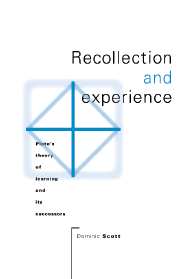GENERAL INTRODUCTION
Published online by Cambridge University Press: 03 December 2009
Summary
Socrates thought that an awareness of our own ignorance should create a desire for the knowledge that eludes us. Plato agreed with him, but went on to ask how such knowledge, which had managed to elude even Socrates, could ever be acquired. He found his answer in the theory of recollection, one of his most notorious philosophical legacies. What we now call learning, he claimed in the Meno, is in fact the recollection of knowledge had in a prenatal existence. None of his successors, Aristotle, Epicurus or the Stoics, found this suggestion convincing, but all of them were sufficiently impressed by the importance of the questions that he was trying to answer to go to considerable lengths to present their own alternatives, their rivals to recollection. Aristotle, in obvious reaction to Plato, placed great emphasis upon perception and experience both in scientific and ethical learning. Epicurus and the Stoics also developed sophisticated accounts of the role of experience in learning and, in addition, showed an increasing interest in distinguishing between those elements of our thinking that arise naturally and those that derive from cultural influences. Seen in this light, Plato's theory of recollection acted as the catalyst for what was to be a long-running philosophical debate about the origins of knowledge.
Precisely because Plato's successors acknowledged the importance of his questions but replaced his answers with their own, we have the opportunity to compare these different theories diachronically, to see how a certain theme develops over the course of ancient philosophy.
- Type
- Chapter
- Information
- Recollection and ExperiencePlato's Theory of Learning and its Successors, pp. 1 - 12Publisher: Cambridge University PressPrint publication year: 1995



